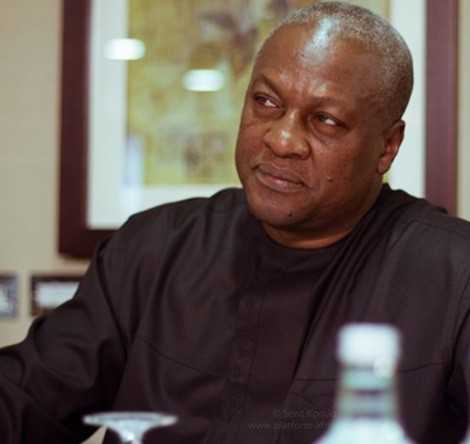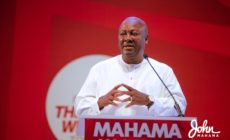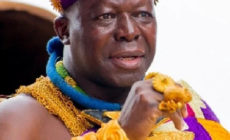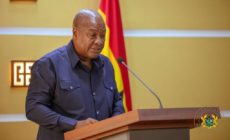 In his first public comment on the strike action embarked upon by the doctors, he said,”The right to negotiate by professional groups is sacrosanct and I believe that the government and the medical doctors must continue the negotiations on their conditions of service to reach an amicable solution without coercion.”
In his first public comment on the strike action embarked upon by the doctors, he said,”The right to negotiate by professional groups is sacrosanct and I believe that the government and the medical doctors must continue the negotiations on their conditions of service to reach an amicable solution without coercion.”
In a no- holds-bared speech delivered at the opening of the 10th Biennial General Meeting of the Ghana Registered Midwives Association (GRMA) at the University of Ghana today, the President minced no words that he would insist on what was lawful and good for the nation no matter the political cost.
“I am determined to hold the line no matter the political cost,” he said to applause from the gathering.
The theme for the five-day conference is ‘GRMA, Delivering and Caring for 80 years and beyond.”
He said in negotiations for conditions of service, equity must also hold centre stage.
“We are dealing with a matter of equity and principle here,” he said, adding that the linkages and relativities between all public sector workers must hold sway.
A friend’s request
Mr Mahama stated that last Tuesday, a friend of his suggested to him to intervene and accede to the demands of the doctors since there were only about 2,800 doctors in the public sector.
“What he (friend) failed to realise is that there are 598,000 other public sector workers organised in 11 other professional groups lined up just waiting to see that the workers come away with from the negotiation table before they put in their own demands,” he added.
He said the situation would adversely affect the single spine pay policy and could result in “breaking the spine.”
He added: “Ironically I will say that if this spinal chord will break, it must not be at the hands of a group whose principal calling is rather to heal.”
He said a lot of efforts had gone into implementing the universal salary structure and nothing must be done to derail the progress made.
Public sector negotiations
President Mahama said other negotiations were currently ongoing at the Public Services Joint Negotiations Committee and that any agreements that were reached in respect of allowances and conditions of service would have to be appropriately captured in the budget.
“And I want to emphasise that I will not authorize any expenditure on wages and compensation not provided for in the budget,” he stressed.
Election year
President Mahama said in an election year, pressures and the temptation to yield to such demands only ballooned the government budget.
During the implementation of the SSSP, pressures from various groups of professionals led to various remuneration and compensation awards, and the net effect was the ballooning of the wage bill from just under GH¢3 billion to GH¢8 billion, amounting to about 73 percent of total tax revenues.
“The effects of that increase on the economy is still being felt up-to today, and we are managing gradually to turn the situation around,” he added.
Fiscal discipline
The President said fiscal discipline required that not a single pesewa on remuneration was spent outside what had been budgeted for.
That, he said, goes to Article 71 holders and those on the single spine pay policy. “It goes for the President as well as the lowest public sector employee.”
He said the people had sacrificed a lot, and nothing must be done to push further stress on them.
He reiterated that the current International Monetary Fund programme should be the last time the country should reach to the Breton Woods institution for respite.
He expressed his appreciation to the Midwives for keeping faith with the negotiation process and said government would negotiate in good faith at all times.
He expressed the hope that the midwives would make good use of the resources being put at their disposal.
Mr Mahama commended the midwives for their dedication to duty, which he said had gone a long way to help reduce maternal and child mortality.
He said as the government continues to invest in the health sector, the situation would further come down to the zero level. He reiterated the commitment of the government to attaining the MDG goals 4 and 5.
President Mahama said plans were ready to commence a new initiative to train midwives to perform basic ultrasound scan for pregnant women.
He said over 500 portable electric scan machines were being procured for the programme. He said over 600 midwives working in CHIPS compounds and health centres would be trained by the first quarter of 2016.
GRMA president
The President of the GRMA, Mrs Joyce Jetuah, said the GRMA must be granted bargaining powers as other professional bodies in the health sector.
She promised that the midwives would continue to work diligently to improve health delivery.
Ghana Health Service
Dr Ebenezer Appiah Dankyira, the Director-General of the Ghana Health Service expressed appreciation to the government for its commitment to bring health services closer to the people.
He said everything needed to be done to trace pregnant mothers to even the remotest parts of the country to give them care.
ICA President
The President of the International Confederation of Midwives ( ICM), Ms Frances Day-Stirk, recognised the leadership of President Mahama and the political will of the government in attaining the best for midwifery, and said Ghana, with about 5,000 midwives, needs at least 10,000 more to meet demands.










 (Selorm) |
(Selorm) |  (Nana Kwesi)
(Nana Kwesi)